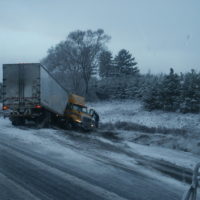Why Do Tractor-Trailers Jackknife?

You’ve heard the term many times while listening to traffic reports on the news—a jackknifed tractor-trailer has caused a shutdown of a local highway, or resulted in a serious collision. You may have even seen a semi-truck jackknife while out on the road or, worse yet, been involved in a collision with a jackknifed truck. Perhaps you’re wondering, how does jackknifing occur, and is there any way to prevent it from happening? Learn more about large truck jackknifing below, and contact a West Virginia personal injury lawyer if you’ve been the victim of a truck jackknife accident.
What happens during a jackknife accident?
Large trucks are designed so that only the front portion, or cab, has powered wheels. The trailer’s wheels are not powered and will continue moving in the same direction as they had been unless they are gradually steered another way. If the cab comes to a very abrupt stop, or skids on a slippery roadway surface and turns sharply to one side, the trailer’s wheels will generally keep moving forward in the same direction they were going. This causes the cab and trailer to fold in on one another, causing the formation of a V or open jackknife shape. In cases where the truck is traveling at a high rate of speed when it jackknifes, the truck’s momentum may even cause it to roll over while jackknifing.
Common causes of jackknifing
Jackknife accidents are typically caused by a tractor-trailer losing traction with the roadway. This can result from brake lock; slippery, wet, or icy roadway conditions; or a sudden obstruction in the roadway causing the driver to turn sharply and skid. Another common reason that trucks lose traction with the road is when the cargo is unevenly distributed in the trailer, or the trailer is entirely empty. An uneven or insufficient load can cause imbalances which cause the truck’s tires to lose traction.
Ways to prevent jackknifing
While certain causes of jackknifing cannot be predicted, truckers are required to drive defensively and in such a way that minimizes the chances of jackknifing. For example, truck drivers must exercise great caution when roads are slippery. Drivers must also minimize opportunities for abrupt braking by not following other vehicles too closely and braking slowly over a longer distance. When truck drivers and carrier companies fail to adhere to these safety guidelines, they can bear liability for serious jackknifing accidents and resulting injuries.
If you’ve been injured in a tractor-trailer or big-rig collision in West Virginia, contact the dedicated, aggressive, and knowledgeable Martinsburg personal injury lawyers at Burke, Schultz, Harman & Jenkinson for a consultation, at 304-263-0900.